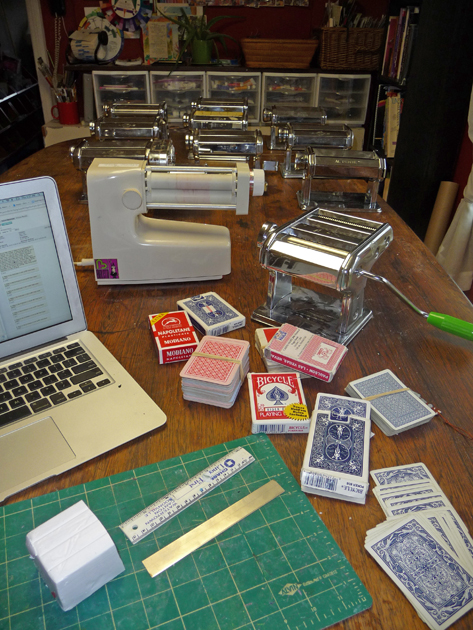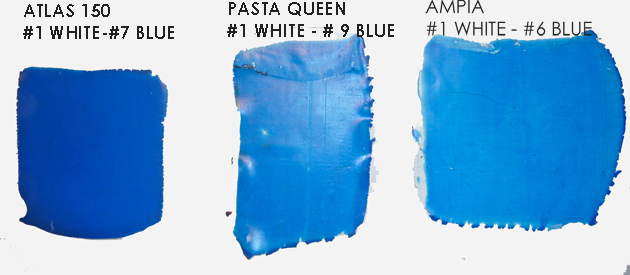 Last week Sage Bray, the editor of The Polymer Arts magazine, and I had a guest post on Polymer Clay Daily about measuring thicknesses on pasta machines. We asked the polymer community to follow measuring instructions and fill out a short survey. We’ve heard from artists all over the world and so far we’ve collected more than 60 responses, not including my 12.
Last week Sage Bray, the editor of The Polymer Arts magazine, and I had a guest post on Polymer Clay Daily about measuring thicknesses on pasta machines. We asked the polymer community to follow measuring instructions and fill out a short survey. We’ve heard from artists all over the world and so far we’ve collected more than 60 responses, not including my 12.
I have over a dozen pasta machines picked up over the years at garage sales and thrift stores. Most of them are similar to the Atlas 150 but two of them are very different. The large white one on the left is a Bialetti, an electric machine with plastic rollers that are slightly textured. The mini one on the right is an old Ampia with the noodle maker permanently attached. I’ve measured them all with both the metric stacking system and the playing card system and found a huge variation. It was an eye opener!
Why does it matter so much to me personally that we come up with a way to consistently and accurately refer to the thickness of pasta machine settings?
In my Watercolor Technique Tutorial I show how to create sheets with the appearance of a watercolor wash. The basic version of the technique is to lay a thin sheet of color on a thick sheet of white and run them through at the thinnest setting on the pasta machine.
I tested three different machines by following the basic Watercolor instructions – thinnest color over thickest white. I used a 3/4″ square cutter to cut out the same size squares for each sample. The clay run through on the Atlas 150 did not wash – the white does not show through the color. The clay run through the Pasta Queen washed a little bit and the Ampia washed beautifully.
The differences in the amount of color washing are entirely the result of variations in the thick and thin settings.
There are now so many different pasta machines, and the range of settings is so large, that I can no longer use the basic instructions for the Watercolor technique. I need a way to insure that all the students in my classes will get the same results regardless of what pasta machine they use. I need a standard for measuring thickness.
If you’ve already sent in the survey, thank you! If you haven’t, there’s still time. Just go to PCD, measure your pasta machines and fill out the survey. If you do it by Saturday, March 31st at midnight my time, Pacific Standard (PST), you will be entered to win one of the prizes.
We will be publishing a summary of the results on PCD next week. The more data we get from around the world the better! Let’s do it.



March 31, 2012 at 10:23 am
I wish that we would spend this much effort on making sure that all women’s clothing were standardized. If you wear a size 10 in one manufacturer, you wear a size 10 in all manufacturers. I just had to say that, it has bugged me for a long time. lol
March 31, 2012 at 2:30 am
Good example Maggie. Looking forward to your results and the setting of a standard!
March 30, 2012 at 7:45 pm
I’m eager to see your results, Maggie. I am also interested in whether you find much variation in same-model machines. I long for a pasta machine that is engineered, built, calibrated and fine-tuned enough that there is no “wobble” in the rollers. Since I have extra pasta machines for students, I’ve seen a huge variation even in the same brand. That seems to be hit or miss for me.